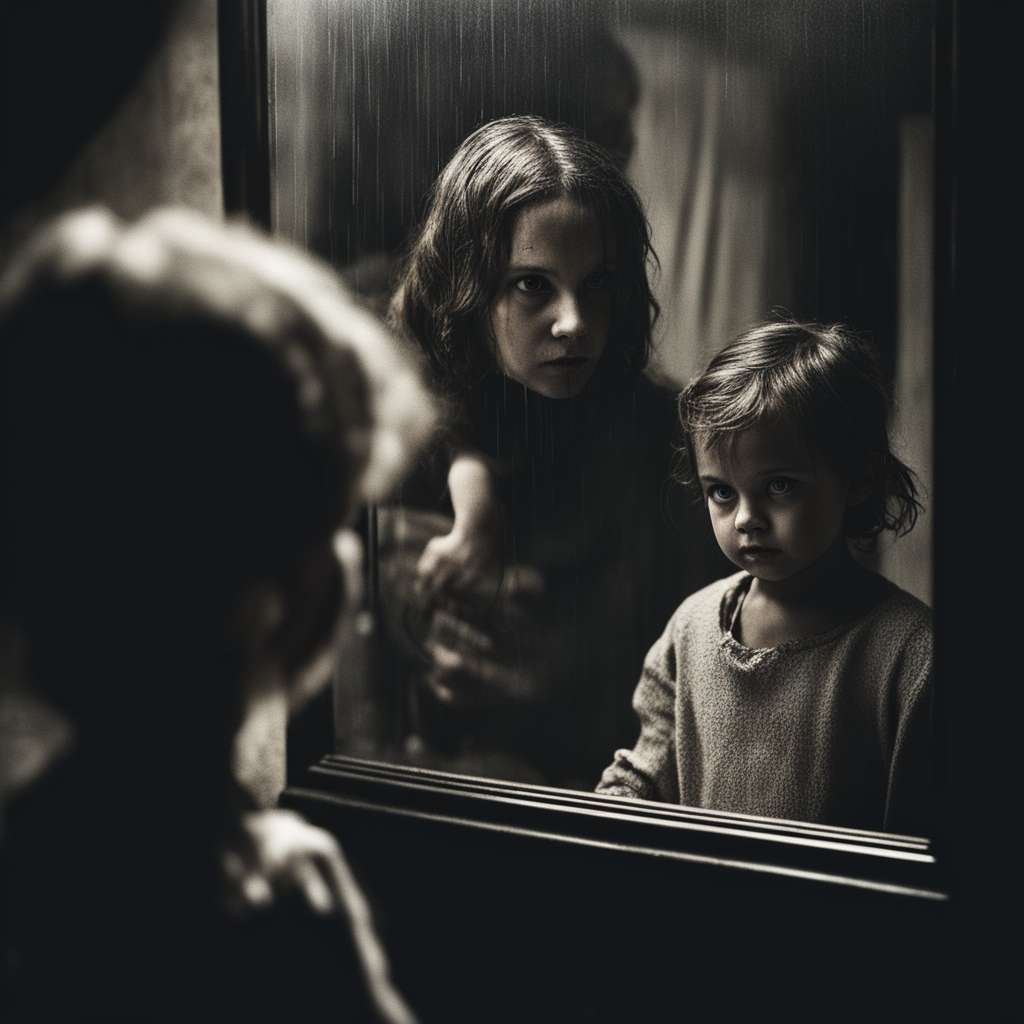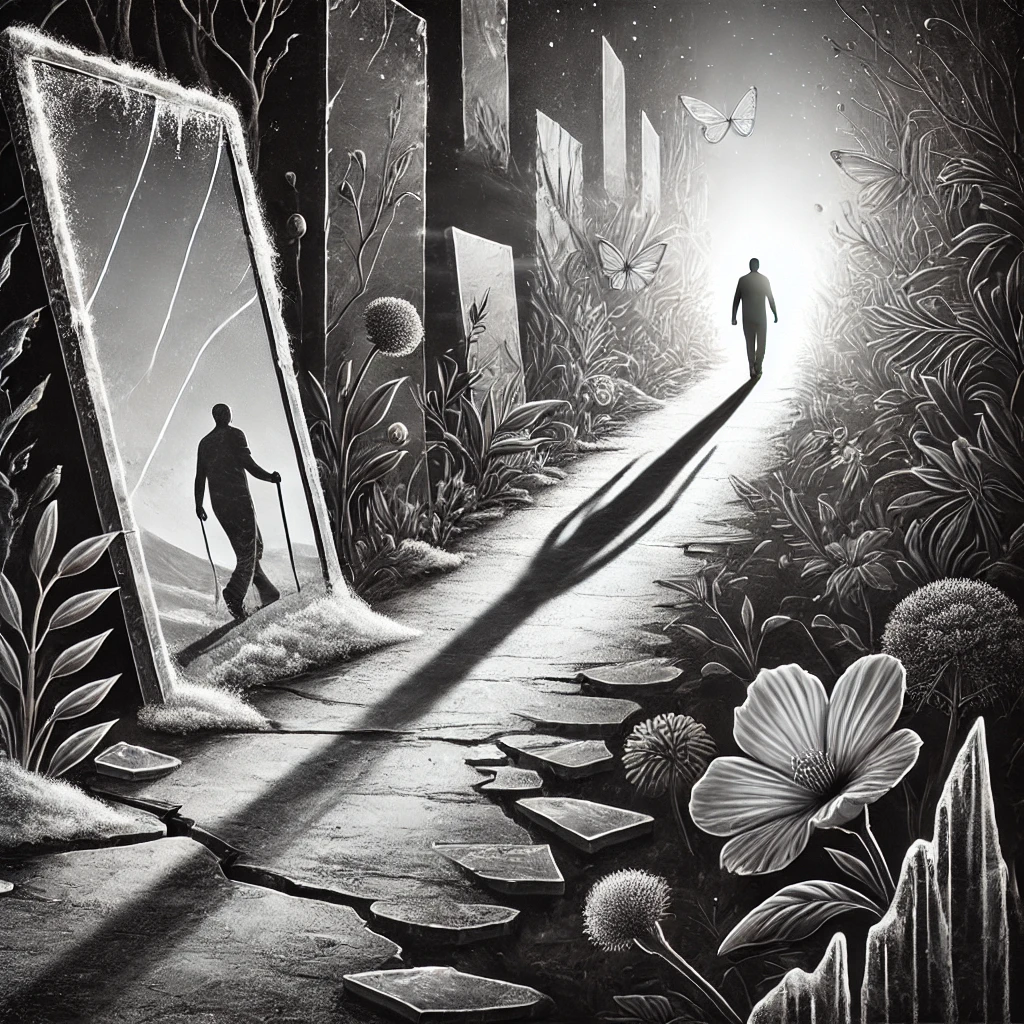Hello and welcome to Letters from Mom here at The Real Underbelly! I’m deeply thankful that you’ve taken a moment to read my letter today. I’d like to share a part of my journey with the hope of inspiring others. The years growing up were marked by childhood abuse, and this experience has profoundly shaped my life. My story is one of overcoming adversity and discovering healing, and I want to show that it is truly possible to build a fulfilling and joyful life despite the challenges. You do not have to walk this path alone!

Every day, I am deeply grateful to the Creator for the opportunity to share my life with these wonderful individuals I am proud to call my children. Raising children in this world comes with many challenges, and my own experience as a survivor of childhood abuse has made me acutely aware of the importance of every moment spent nurturing them. No day can be taken for granted.
I am here to offer a story of hope and healing to anyone who might be dealing with the shame of abuse and ways to cope. You absolutely can live a more fulfilling life with your children and love yourself! Don’t you agree that they deserve the very best version of you? Let’s begin, shall we.
Held Underwater
Growing up in an abusive home is an incredibly challenging experience for children. It can often feel like living in a locked tower, waiting for a prince charming to come and rescue you. Unfortunately, most mistreated children don’t have that fairy-tale savior. I endured the pain of abuse throughout my childhood, and through this suffering, I have learned from God the power of forgiveness. I wont go into to much detail about the pain I endured, but a few things were very significant and shaped the way I felt about myself, for years to come.

Every morning was a mix of dread and anticipation. I would sit on my bed, waiting for the commands of my stepmother, who had her own rituals before sending me off to school. One of these rituals involved me looking in the mirror and repeating the words, “You are a disgusting, ugly person.” I would recite these words over and over, and they haunted me for years. The mirror became an enemy, and I grew to loathe my reflection.

As a child, I was subjected to harsh punishments. I was forced to strip naked and stand against the wall in my bedroom, arms raised, for hours on end. Small, cruel techniques were used to break my spirit. After school, I endured ice cold baths, where she would hold me under the water and taunt me while I gasped for air. These are just a few examples of the torment I suffered as a five-year-old, trying to navigate a world that already felt confusing and harsh.
They Need You Both
The first three years of a child’s life are crucial, as this is when they are most impressionable. By the age of five, a child’s brain is 90% developed, highlighting the importance of a strong foundation from the very beginning. Both parents have a significant impact on a child’s development even before birth. Having both parents present during childhood is crucial for a child’s overall growth—spiritually, mentally, emotionally, and physically.
Having both a mom and a dad around is super important for kids. Here’s why:
- Different Skills: Moms and dads often have different skills. Moms might be better at being cuddly and understanding and dads might be better at teaching how to build things or play sports. Kids learn lots from both!
- Stronger Kids: Consequently when kids have both a mom and dad they, feel safer and happier. It’s like having two people to protect them and help them grow.
- Learning About Life: Kids learn about how the world works by watching their parents. Having both a mom and dad shows kids different ways to think and solve problems.
Teenage Years Were Tough
I can’t remember the exact age when my parents divorced, but I think I was around 11. After the separation, I was left in my father’s care, who then largely abandoned me. Looking back, I understand that he was suffering from the relationship’s end as well, but I still find myself asking, “Why didn’t you protect me?” In the days following their separation, he would retreat behind his bedroom door after work, speaking only a few words to me if I was fortunate. Even though I found this isolation preferable to facing the harshness of that woman, I still felt incredibly alone. After years of abuse and suffering, I was left questioning my life and whether I truly cared about anything.
Growing up without a solid foundation left me exceptionally vulnerable as I entered my teenage years. The abuse I endured created a turbulent environment, making my transition into adolescence particularly challenging. I struggled with a fractured sense of identity, constantly grappling with feelings of confusion and a lack of direction.
Left Feeling Void
Trusting others was daunting; the betrayal and hurt I had experienced made it nearly impossible to form meaningful relationships. The emotional turmoil I faced was intense, with sadness, anger, and self-doubt often overwhelming me. The instability at home affected my focus in school and my ability to engage socially, leaving me detached and anxious about my future.
In an attempt to cope with these profound challenges and fill the void left by my painful past, I turned to drugs and alcohol at an early age. The lure of these substances seemed like a temporary escape from the relentless pain and confusion that plagued me. Without a guiding hand or advocate to help me navigate the already difficult terrain of my teenage years, I was easily swayed by the temptations that offered fleeting relief.

The allure of drugs and alcohol became a way to numb the emotional wounds and temporarily block out the harsh realities of my life. It was a desperate attempt to escape the relentless suffering and to find some semblance of comfort. This path, however, only compounded my struggles, leading to a cycle of self-destruction and further distancing me from the healing I so desperately needed.
Find Peace

The challenges I faced growing up, marked by abuse and neglect, underscore the profound impact of childhood trauma on an individual’s life. As I navigated my turbulent teenage years, the absence of a solid foundation and the lack of emotional support led me down a path of self-destructive behaviors, seeking temporary relief from the pain that I had endured.
Despite these difficulties, I was determined to find peace within myself. I actively sought answers and explored various avenues to heal and improve my life. I refused to settle into a victim mindset, always striving to become better and to find joy despite the hardships. Though I made mistakes along the way, my quest for happiness and self-improvement never wavered. This journey of continuous search for fulfillment and personal growth has been central to my healing process.
Recognizing the long-term effects of such trauma highlights the critical need for healing and transformation—not only for those who have experienced abuse but also for those who have the power to prevent it. Addressing and overcoming the scars of childhood trauma is essential for breaking the cycle and ensuring that future generations do not suffer the same fate.
As we move forward, it becomes crucial to focus on how parents can heal from their own childhood abuse and build healthier, more supportive environments for their children. By understanding and addressing their past traumas, parents can develop the tools and strategies necessary to foster resilience and emotional well-being in their families. This proactive approach can significantly reduce the likelihood of perpetuating cycles of abuse and create a more nurturing atmosphere for their children.
Forgiving First
Overcoming low self-esteem is a challenging yet transformative journey, and the power of thought and prayer plays a crucial role in this process. One of the most important steps in healing is learning to put aside the pain and embrace forgiveness, both for oneself and others. Forgiving those who have hurt us, as well as forgiving ourselves for past mistakes, is essential to breaking free from the chains of low self-worth and moving towards a more empowered self.

Through consistent effort and trust in these practices, my husband and I have cultivated a daily routine that reinforces our commitment to self-healing and growth. Our shared belief in the power of the mind to shape our reality has been a cornerstone of our approach to overcoming challenges.
To aid in this process, I highly recommend several insightful books that have been instrumental in my own journey:
- “The Four Agreements” by Don Miguel Ruiz. This book offers practical wisdom and guidance on how to live a fulfilling life by embracing four key principles.
- “As a Man Thinketh” by James Allen. A classic work that explores the impact of thought on personal success and self-esteem.
- “Outwitting the Devil” by Napoleon Hill: This book provides profound insights into overcoming self-doubt and achieving personal freedom.
Embracing these principles and integrating them into daily life can help shift perspectives and build a foundation of self-worth. Despite the mistakes I’ve made along my journey to becoming a mother, I have always maintained my faith in the forgiveness and the power of positive thinking coupled with prayer. This unwavering trust has been a guiding light, helping me navigate challenges and continue striving for personal growth.
The Power of Thought
One of the first steps is to recognize and challenge negative thoughts about yourself. These thoughts might be loud and persistent, but they aren’t true.

Have you ever paused to listen to that inner voice within you? This “other self,” as we might call it, is not truly who you are but a separate consciousness within your mind. It’s important to acknowledge this voice and not let it dictate your sense of self-worth. When negative thoughts arise, let them come and go without acting on them. Allowing them to drift away without giving them power can become a habit, just as negative thoughts can be replaced by positive ones.
Your mind is a vital part of who you are, one of the most crucial aspects of your consciousness. You need to learn how to control it by not yielding to every negative thought. As God said, “I did not give you the spirit of fear, but of love, power, and a sound mind.” This means you have the power to change your life’s outcome.
Once, I struggled with depression and anxiety, but I chose to embrace the inner strength and potential within me. By learning to harness this power, you can transform your mindset and life. Your mind holds great potential to teach you about yourself and the world. If you truly listen to your inner self, you might realize some harsh truths about your own negativity, but remember, change is possible. You just have to actively work against those negative tendencies to create a more positive mindset.
Setting Boundaries: Protecting Your Peace
Saying “no” can feel uncomfortable, especially if you’re used to putting others first. But it’s essential for your well-being. Healthy boundaries are like fences around your garden; they protect what’s precious inside.
Understanding Your Limits:
- Know your worth: You deserve respect and kindness even when you are down and do not feel as so. Repeat this everyday, “I am deserving of EVERYONES respect and kindness”. Do not settle for less!
- Identify your triggers: What situations make you feel overwhelmed or drained?
- Prioritize self-care: Make time for activities that recharge you. Do something nice for yourself once in a while. Remember your worth and that you deserve your kindness towards yourself as well!
Dealing with Guilt:
It’s normal to feel guilty when setting boundaries. Remind yourself that taking care of yourself isn’t selfish; it’s necessary. You can’t pour from an empty cup.
Remember, setting boundaries isn’t about being unkind; it’s about self-respect and self-preservation. It’s okay to say no, and it’s okay to prioritize your needs. Your well-being matters.
Setting boundaries can be tricky, especially in certain situations. Let’s explore some common challenges and how to navigate them.
Family and Friends
It’s often hardest to set boundaries with those closest to us. They might feel entitled to your time and energy, making it difficult to say no. For example, a family member might constantly ask for favors without considering your needs.
- Setting limits: Clearly communicate your boundaries without guilt or resentment. Use “I” statements to express your feelings.
- Prioritizing self-care: Explain that you need time for yourself to recharge.
- Offering alternatives: Suggest other ways to help or support them that don’t overwhelm you.
Work Environment

Setting boundaries at work can be challenging, especially if you’re worried about job security. Overworking, constant availability, and unclear expectations can lead to burnout. And besides, is it worth your happiness?
- Time management: Set specific work hours and stick to them.
- Learn to delegate: Don’t be afraid to ask for help. Step up and learn how to speak up for yourself.
- Communicate your workload: If you’re feeling overwhelmed, talk to your supervisor. Do not be passive about how you are feeling. Take action.
People Pleasing
People-pleasing can make it difficult to set boundaries. You might feel guilty or selfish for saying no. This might be a habbit you picked up as a child in an abusive home, or just in general.
- Challenge your beliefs: Are you trying to earn love and approval through people-pleasing?
- Focus on self-worth: Your worth is not defined by what others think of you.
- Practice self-compassion: Be kind to yourself.
Set Boundaries
Remember, setting boundaries is a form of self-care. It’s about respecting your needs and limits. It’s okay to put yourself first sometimes.
Setting boundaries can be especially difficult for those who grew up in abusive environments. The fear of abandonment, the need for approval, and the distorted sense of self-worth can make it incredibly challenging to assert your needs.
Growing up in a chaotic or abusive home can teach us to people-please as a survival mechanism. This pattern can persist into adulthood, making it hard to say no. It’s important to remember that your past doesn’t define your future. You can learn to break free from these harmful patterns.
It might take extra time and effort to establish healthy boundaries, but it’s worth it. Celebrate small victories and be patient with yourself. Remember, you deserve to be treated with respect, and you have the right to protect your peace.
Overcoming the Fear of Abandonment
The fear of being left alone can feel overwhelming. It’s like walking through life with a constant shadow of doubt. This fear often stems from childhood experiences, where safety and love felt uncertain. But remember, you’re stronger than that fear.
Building trust in yourself and others takes time. It’s like planting a garden; you have to nurture it with care. Surround yourself with people who make you feel safe and valued. And most importantly, be patient with yourself. Healing is a journey, not a race.
You deserve love and belonging. Don’t let fear hold you back. With time and effort, you can overcome this challenge and build fulfilling relationships.
Recognizing Unhealthy Relationships

Growing up in an abusive environment can warp our perception of love and relationships. It can create a dangerous familiarity with unhealthy dynamics, making it difficult to recognize and escape toxic patterns.
It’s essential to identify the red flags in a relationship. These might include:
Recognizing the Signs
- Isolation: Are you being prevented from spending time with friends or family?
- Control: Your partner tries to dictate your choices, from what you wear to who you see.
- Gaslighting: Making you doubt your own reality or perception.
- Emotional Abuse: Constant criticism, belittling, or shaming.
- Physical Abuse: Any form of physical harm is unacceptable.
Codependency: A Hidden Trap
For many survivors of abuse, codependency can become a way of life. I know this all to well it’s the unhealthy reliance on others for emotional well-being, often rooted in a deep-seated need to be needed. I spent a large majority of my twenties in relationships, trying to fill that gap by feeling needed. It is usually coupled with an abusive relationship that does not lead to anything good.
It’s Ok to Say No!

Consider whether you struggle with setting boundaries. If you find it difficult to say “no” or establish limits with others, you may be overextending yourself, which can lead to feelings of being overwhelmed or exploited. This often accompanies a deep-seated fear of abandonment. If the idea of being left alone or rejected triggers intense anxiety, you might engage in behaviors aimed at preventing others from leaving you.
Another sign is a reliance on others to boost your self-esteem. If you constantly seek reassurance from others to feel good about yourself, this might indicate that your sense of self-worth is closely tied to their approval. This can be compounded by enabling others’ dysfunctional behaviors. If you find yourself excusing or supporting unhealthy actions in those close to you, you may be enabling rather than encouraging positive change.
Codependency often manifests in difficulty being alone. If you feel uncomfortable or anxious when you’re by yourself and frequently seek companionship to avoid solitude, it may point to a lack of self-sufficiency. Alongside this, you might notice a tendency to sacrifice your own needs for the sake of others. This self-neglect can lead to frustration and resentment, as you might feel that your personal identity is being overshadowed by the needs of those around you.
Unhealthy Dynamics
In relationships, you may experience unhealthy dynamics, such as an imbalance of power. Being overly submissive or overly controlling can indicate codependency. Likewise, excessive sacrifice, where you continuously give more than you receive, can deplete your energy and lead to feelings of being unappreciated.

Codependency can also involve a tendency to seek to rescue or fix others. If you’re heavily involved in trying to solve others’ problems, sometimes at the cost of your own well-being, this is another potential sign. Finally, if you experience guilt when taking time for self-care or prioritizing your own needs, it suggests that you might be neglecting your own health and happiness for the sake of others.
Recognizing these patterns within yourself is an important step towards addressing codependency. By building self-awareness and focusing on developing healthy boundaries, self-esteem, and independent emotional well-being, you can work towards more balanced and fulfilling relationships.
Break Free
Understanding the signs of codependency is crucial for breaking free from unhealthy patterns, but it’s equally important to recognize how these patterns can impact our children. Childhood abuse often creates a ripple effect, with its consequences extending into future generations. By healing our own wounds, we not only improve our lives but also create a healthier environment for our children.
When we break free from the chains of a victim mentality, we shatter the negative thought patterns that have held us captive. This liberation empowers us to model healthy relationships, effective communication, and unwavering self-worth for our children. It’s like building a strong foundation for a house: by fortifying our own emotional well-being, we create a stable platform for our children to grow and flourish.
Open the Door
The mind is an incredibly powerful tool in this process. When healing from childhood abuse, your mind acts as both a battlefield and a sanctuary. It has the power to shape your reality and influence your path forward. The ultimate decision on how to use this tool rests with you. God, as a gentleman, will not force his presence upon you but will gently knock on the door of your heart, offering peace and guidance.

Reflect on whether you hear this call and if you are ready to embrace it. Forgiveness and healing are available to you, and they offer the possibility of transforming your life and that of your children. What do you truly have to lose by opening that door? The potential loss is not just your own peace but the happiness and future of your children. Choosing to embrace healing and forgiveness is a decision that can profoundly impact both your life and your family’s well-being.
By taking that first step, you’re not just healing yourself; you’re breaking the cycle of pain for generations to come.
Let’s reclaim what is rightfully our’s in this digital noise we live in. Join us in this exploration of how deep the rabbit hole actually goes.

No responses yet